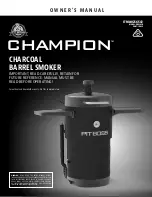
GB
1
3
D
o
Not
In
order
to
keep
your
ceramic
hob
in
good
condition,
follow
these
simple
guidelines:
Do not
stare at halogen heating units.
Do not
cook directly on the hob surface without a
cooking utensil, as this will result in damage
to the surface of the hob.
Do not
use the hob as a worktop surface as
damage may occur to the smooth surface of
the hob.
Do not
drag or slide utensils on the hob surface, as
this will cause scratches in the surface of the
hob.
Do not
allow a cooking utensil to come into contact
with the hob surround.
Do not
place anything between the base
of the utensil and the ceramic
hob, e.g. do not use asbestos
mats, aluminium or wok stand.
Do not
leave any utensils, food or combustible
items on the hob when it is not in use.
Do not
place aluminium or plastic foil, or plastic
containers on the hob.
Do not
leave the hotplates or cooking areas
switched On unless they are being used.
Do not
leave heating zones uncovered when they
are switched On. We recommend not to
place large preserving pans or fish kettles
across two heating areas.
Do not
leave utensils partly covering the
heated areas. Always ensure that
they are placed centrally over the
heated areas and have the same
diameter as the heating area used.
Do
Always
ensure that the bottom of the pan is both
clean and dry. Dirt or moisture between the
pan and the hob can cause pitting of the
surface of the glass.
We do not recommend the use of utensils with a
base diameter greater than 25cm (l0ins).
Pressure cookers or other large pans should be
used on the front cooking areas.
Always
ensure that saucepan handles are positioned
safely.
Always
take extra care when cooking foods with a
high sugar content eg. jam, as spillage will
cause damage to the surface of the glass.
Always
clean spills immediately (see Care and
Cleaning).
IMPORTANT
As with any cooking appliance
there could be some fire risk attached to the heating
of oil, particularly for deep fat frying, cooking
utensils containing oil
must not be left
unattended
(e.g. to answer the telephone) on or in
close proximity to the patterned cooking areas.
1. Use a deep pan, large enough to completely
cover the appropriate heating area.
2. Never fill the pan more than one-third full with fat
or oil.
3. Never leave oil or fat unattended during the
heating or cooking period.
4. Do not try to fry too much food at a time,
especially frozen food. This only lowers the
temperature of the oil or fat too much, resulting
in greasy food.
5. Always dry food thoroughly before frying, and
lower it slowly into the hot oil or fat. Frozen
foods, in particular, will cause frothing and
spitting, if added too quickly.
6. Never heat fat, or fry, with a lid on the pan.
7. Keep the outside of the pan clean and free from
streaks of oil or fat.
8. Never allow excessive splashing of oil onto the
hob.
S
af
e
ty
re
q
uiremen
ts
f
or
d
ee
p
fat
f
r
y
ing
In the unfortunate event of a chip pan fire:
1. Switch
Off
the electricity supply.
NEVER
attempt to move the pan - burns and
injuries are caused almost invariably by picking
up the burning pan and rushing outside with it.
2. Smother flames with a fire blanket or damp cloth.
NEVER
use a fire extinguisher to put out a pan
fire, as the force of the extinguisher is likely to
tip the pan over.
NEVER
use water to extinguish oil or fat fires.
When smothering the flames DO ENSURE that
you FACE and ARMS are WELL PROTECTED
from the flames to save you from becoming hurt.
3. After the fire has been extinguished LEAVE THE
PAN TO COOL FOR AT LEAST 60 MINUTES
BEFORE MOVING IT.
4. If you fail to put the fire out, call the fire brigade
immediately.
Care of the Ceramic Hob
Summary of Contents for EW74
Page 23: ...GB 23 Notes...
Page 24: ...24 GB Notes...














































